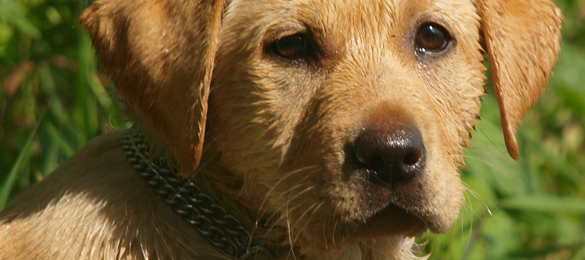
Spring is here at last. And, as the days get longer and the temperatures rise we are excited to get out of the house and enjoy some time playing in the yard, going on walks, or jumping into ponds for a quick dip. It is time to take off the doggie sweaters, put away the snow shovels and meet nature head on. However, before you leave the house, it is important to understand that you and your pets are not the only ones looking forward to hitting the trails. The change in weather will also bring out some unwanted pests, specifically TICKS!
The Ohio Department of Health has sent a memo to health care providers to be on the lookout for Lyme disease and other tick-borne diseases. In this memo the ODH Medical Director and state epidemiologist reports that the main vector for Lyme disease, the blacklegged tick, has spread throughout the state. As animal health care providers we are seeing an increase in animals that test positive for Lyme disease other tick-borne diseases. We feel that it is important to educate our pet owners about some of the risks associated with tick-borne diseases that can potentially effect both human and animal.
Here are the facts:
- Ticks have a life cycle that includes the egg and three stages: six-legged larvae, eight-legged nymph, and eight legged adults.
- Ticks must consume a blood meal at every stage to develop.
- Different stages of ticks will choose different sized hosts, with the younger stages choosing birds and small mammals and the older stages choosing larger mammals and humans.
- Some species of ticks prefer grassy areas along roads and paths, especially near woody or shrubby habitats, whereas some ticks prefer forested areas.
- Ticks like movement, warm temperatures from body heat, and the carbon dioxide exhaled by mammals, which is why they are attracted to hosts such as dogs, cats, rodents, rabbits, cattle, small mammals, humans, etc.
- A female tick is known to attach and feed for 7 to 11 days before she will detach and fall off the host.
- It takes 24 hours of feeding before a tick will transmit Lyme disease.
Preventing tick bites in humans:
- Apply a tick repellant.
- Wear light colored clothing to help identify crawling ticks.
- Wear long-sleeved shirts and pants. Tuck pants into socks, and tuck shirt into pants.
- Perform tick checks frequently.
- Remove ticks immediately.
- Avoid tall grass and weedy areas; stay on paths.
Preventing tick bites in pets:
- Protect pets with reputable anti-tick product.
- Lyme disease vaccination of dogs in Ohio should be considered as infection risk increases.
- Keep your dogs confined to your yard or home where they can be monitored; do not allow them to roam freely.
- Keep dogs on leash during walks, and inspect them for ticks afterwards.
- Avoid tall grass and weedy areas; stay on paths.
Remember, dogs and cats can be treated and prevention can be given against ticks and other external parasites. There are many different products available both over the counter and provided by veterinarians. Due to the fact that there are so many different options for insecticides, some of which could be dangerous if used incorrectly, we feel that it is important to choose a product based on the lifestyle of you and your pet. Before using any over-the-counter medication please consult with a veterinary professional.
If you have specific questions about ticks or tick prevention, please contact Bellevue Animal Hospital at (419) 483-6345 or Sandusky Animal Hospital at (567) 256-3615
-Blog Post Written By Dr. Rizzo


